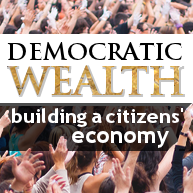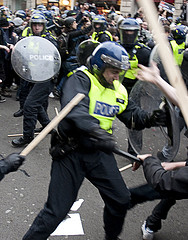
A democratic case for the free market?
Democracy is morally prior to the economy. The structure of the economy is something a sovereign people may and should design and redesign to secure its common good – that is, the shared interest of each and every citizen in life, liberty and economic opportunity. This is the basic premise of the ‘Democratic Wealth’ series that I have the pleasure of editing. This is, however, by no means an uncontroversial premise.

Looking back at the London Riots — moving from macro to micro analysis
The findings that have recently started to emerge from enquiries into the riots that tore through cities across England in early August 2011 paint a picture of systematic disadvantage, ingrained tensions, and radical disjunction between societal groups. Though it has proved impossible to pin down any single unifying cause for this undercurrent of societal disquiet, there is a strong implication that in the absence of concrete policy proposals to mitigate the riots’ causes and effects similar events are likely to take place again — possibly even in the near future. Though at the moment it is too early to provide much more than a diagnosis of ‘what went wrong’, I believe that the prevailing narratives about the riots have ignored …
The elephant in the tent: social and political justice, Tel Aviv, August 2011: a response to Or Rosenboim
Tel Aviv has known many hot summers in its history. But 2011 will probably be remembered as an exceptionally burning summer, one in which the city was flooded by tents occupied by young middle class residents, protesting against the rise in the cost of living. As Or Rosenboim argues, these protests were characterised by the claim to “go beyond the political”, to ask for social justice, referring to the colloquial distinction between issues relating to security and defence, and particularly, the Israeli-Palestinian conflict, regarded as “the political”, and “the social”. I wish to argue that these protests are closely interlinked to questions of foreign policy even though they put in much time and effort to avoid them. In a video …
Beyond left and right: thoughts on the protest in Israel
Since mid-July Israel has been going through a season of turmoil and protest. Most significantly, here, unlike both the Arab Spring movements and the London riots, there has been a violence-free protest. It all began when a young woman, Daphni Leef, had to leave her flat so that her landlord’s son could move in instead. Instead of looking for a new flat, she moved to a tent in Tel Aviv’s main street, ironically named ‘Rothschield Boulevard’. Ms Leef’s protest was not only her own: soon her tent was joined by many others who also wished to protest against the high cost of living in Tel Aviv. Within three weeks the protest swept the entire country. In as many as 3,000 …
South Korean Transition: A Mystery Solved By Social Policy Analysis?
On May 24, 2011 at the Nissan Centre, St. Antony’s College, the book “The Korean State and Social Policy: How South Korea Lifted Itself from Poverty and Dictatorship to Affluence and Democracy” was launched. This lively event brought together all five authors of the book: Stein Ringen, Huck-ju Kwon, Ilcheong Yi, Taekyoon Kim and Jooha Lee. Their goal was to explain the mystery of South Korea’s successful and smooth transition from authoritarianism and poverty to an affluent stable democracy. The authors stressed the importance of governance under authoritarian rule, and explored it through the prism of South Korean social policy from 1945 to 2000. Mixed governance, or state’s collaboration with other actors was at the core of the presentation and …









